ASSIGNMENT ON LANDMARK DEVELOPMENT IN MARITIME LAW
VerifiedAdded on 2022/02/14
|11
|2774
|30
AI Summary
The 'Rotterdam Regulations' propose new international standards for maritime affreightment and shipping commodities by sea. Carriers and cargo owners are the primary targets of the regulations. Various provisions of the convention are supposed to be updated or amended in the area of maritime transportation, which attempts to broaden and modernize existing international rules as well as promote trade law uniformity. In accordance with the convention's wide and uniform legal framework, all parties to a door-to-door shipment contract, including international sea transport, are covered.
Contribute Materials
Your contribution can guide someone’s learning journey. Share your
documents today.
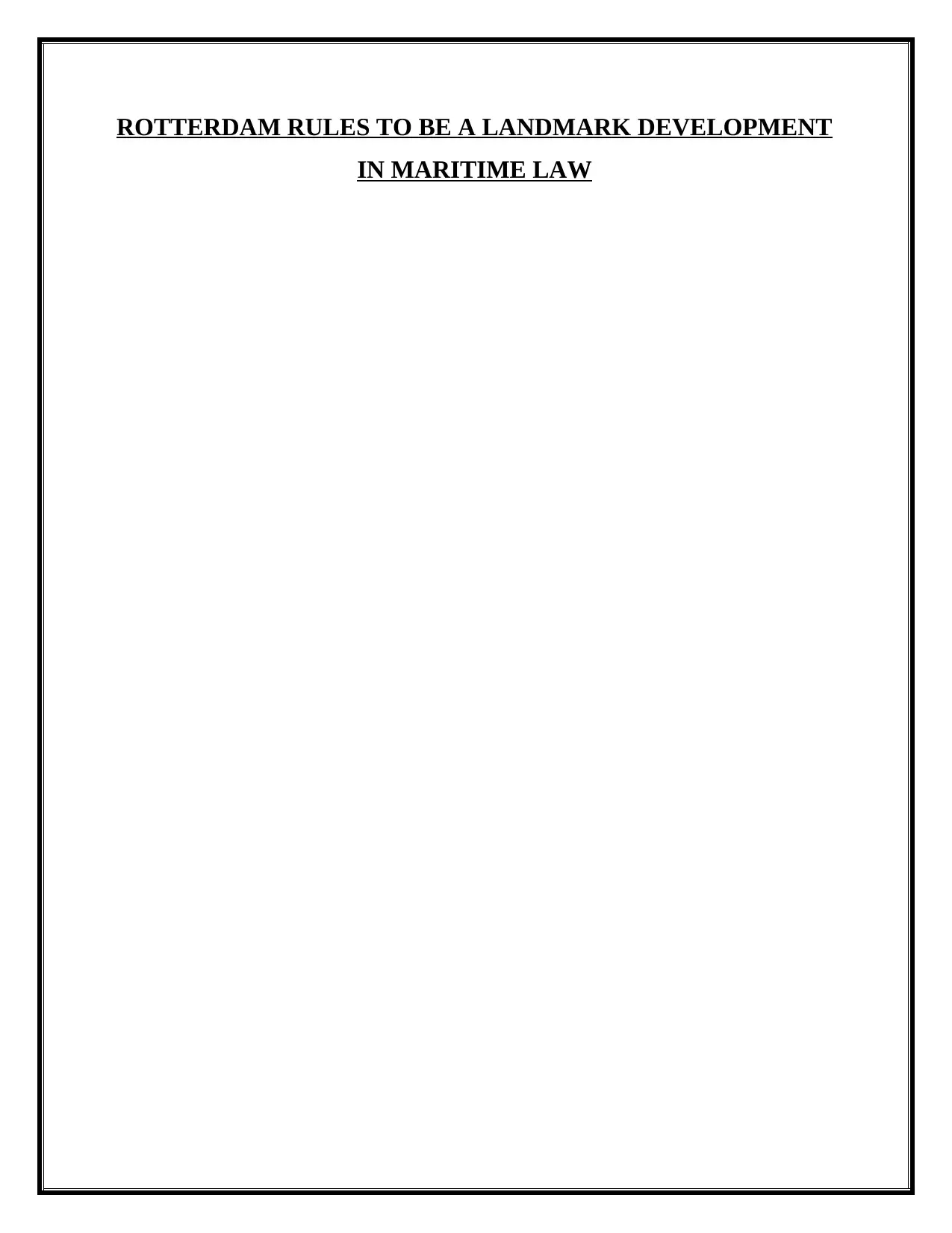
ROTTERDAM RULES TO BE A LANDMARK DEVELOPMENT
IN MARITIME LAW
IN MARITIME LAW
Secure Best Marks with AI Grader
Need help grading? Try our AI Grader for instant feedback on your assignments.
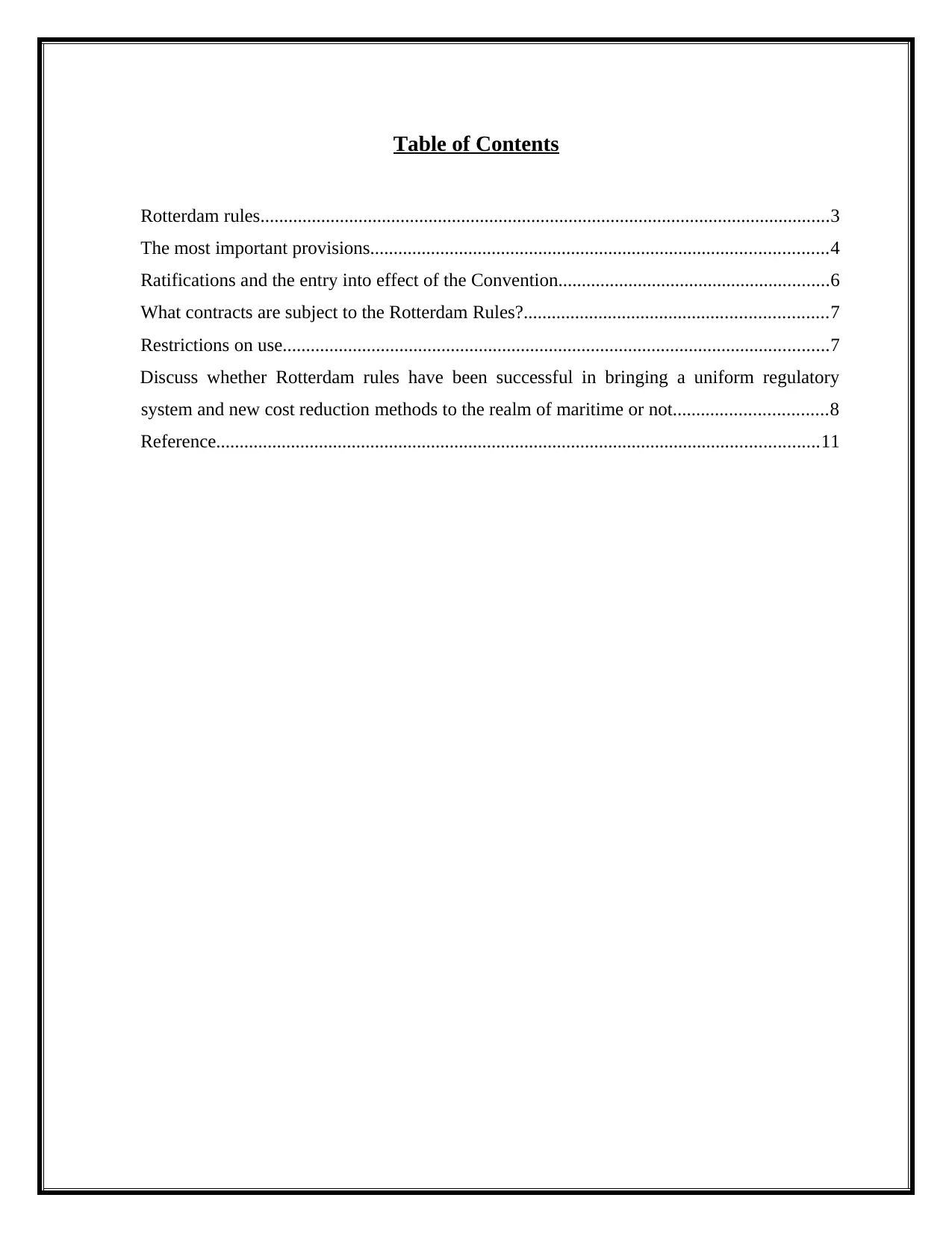
Table of Contents
Rotterdam rules..........................................................................................................................3
The most important provisions..................................................................................................4
Ratifications and the entry into effect of the Convention..........................................................6
What contracts are subject to the Rotterdam Rules?.................................................................7
Restrictions on use.....................................................................................................................7
Discuss whether Rotterdam rules have been successful in bringing a uniform regulatory
system and new cost reduction methods to the realm of maritime or not.................................8
Reference.................................................................................................................................11
Rotterdam rules..........................................................................................................................3
The most important provisions..................................................................................................4
Ratifications and the entry into effect of the Convention..........................................................6
What contracts are subject to the Rotterdam Rules?.................................................................7
Restrictions on use.....................................................................................................................7
Discuss whether Rotterdam rules have been successful in bringing a uniform regulatory
system and new cost reduction methods to the realm of maritime or not.................................8
Reference.................................................................................................................................11
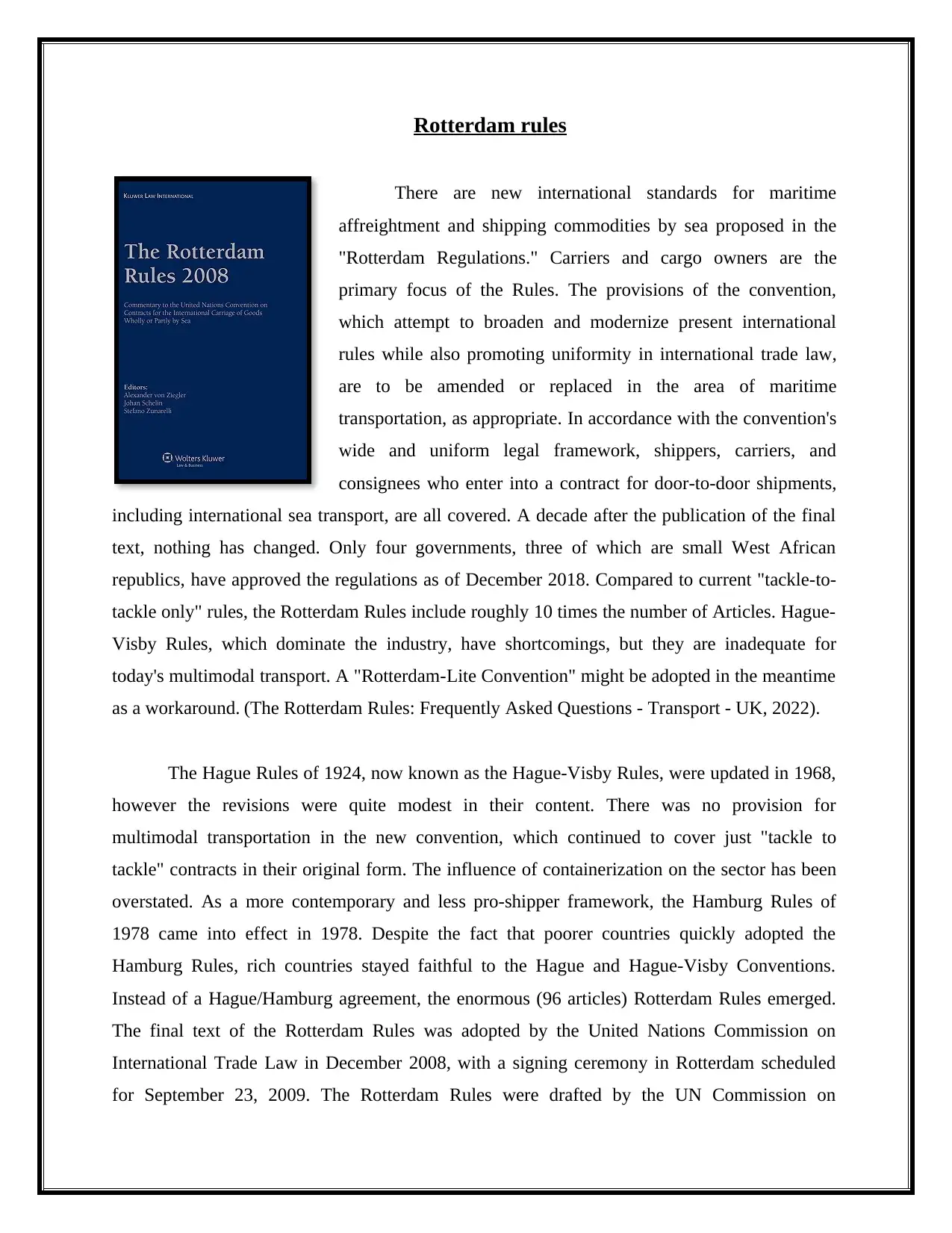
Rotterdam rules
There are new international standards for maritime
affreightment and shipping commodities by sea proposed in the
"Rotterdam Regulations." Carriers and cargo owners are the
primary focus of the Rules. The provisions of the convention,
which attempt to broaden and modernize present international
rules while also promoting uniformity in international trade law,
are to be amended or replaced in the area of maritime
transportation, as appropriate. In accordance with the convention's
wide and uniform legal framework, shippers, carriers, and
consignees who enter into a contract for door-to-door shipments,
including international sea transport, are all covered. A decade after the publication of the final
text, nothing has changed. Only four governments, three of which are small West African
republics, have approved the regulations as of December 2018. Compared to current "tackle-to-
tackle only" rules, the Rotterdam Rules include roughly 10 times the number of Articles. Hague-
Visby Rules, which dominate the industry, have shortcomings, but they are inadequate for
today's multimodal transport. A "Rotterdam-Lite Convention" might be adopted in the meantime
as a workaround. (The Rotterdam Rules: Frequently Asked Questions - Transport - UK, 2022).
The Hague Rules of 1924, now known as the Hague-Visby Rules, were updated in 1968,
however the revisions were quite modest in their content. There was no provision for
multimodal transportation in the new convention, which continued to cover just "tackle to
tackle" contracts in their original form. The influence of containerization on the sector has been
overstated. As a more contemporary and less pro-shipper framework, the Hamburg Rules of
1978 came into effect in 1978. Despite the fact that poorer countries quickly adopted the
Hamburg Rules, rich countries stayed faithful to the Hague and Hague-Visby Conventions.
Instead of a Hague/Hamburg agreement, the enormous (96 articles) Rotterdam Rules emerged.
The final text of the Rotterdam Rules was adopted by the United Nations Commission on
International Trade Law in December 2008, with a signing ceremony in Rotterdam scheduled
for September 23, 2009. The Rotterdam Rules were drafted by the UN Commission on
There are new international standards for maritime
affreightment and shipping commodities by sea proposed in the
"Rotterdam Regulations." Carriers and cargo owners are the
primary focus of the Rules. The provisions of the convention,
which attempt to broaden and modernize present international
rules while also promoting uniformity in international trade law,
are to be amended or replaced in the area of maritime
transportation, as appropriate. In accordance with the convention's
wide and uniform legal framework, shippers, carriers, and
consignees who enter into a contract for door-to-door shipments,
including international sea transport, are all covered. A decade after the publication of the final
text, nothing has changed. Only four governments, three of which are small West African
republics, have approved the regulations as of December 2018. Compared to current "tackle-to-
tackle only" rules, the Rotterdam Rules include roughly 10 times the number of Articles. Hague-
Visby Rules, which dominate the industry, have shortcomings, but they are inadequate for
today's multimodal transport. A "Rotterdam-Lite Convention" might be adopted in the meantime
as a workaround. (The Rotterdam Rules: Frequently Asked Questions - Transport - UK, 2022).
The Hague Rules of 1924, now known as the Hague-Visby Rules, were updated in 1968,
however the revisions were quite modest in their content. There was no provision for
multimodal transportation in the new convention, which continued to cover just "tackle to
tackle" contracts in their original form. The influence of containerization on the sector has been
overstated. As a more contemporary and less pro-shipper framework, the Hamburg Rules of
1978 came into effect in 1978. Despite the fact that poorer countries quickly adopted the
Hamburg Rules, rich countries stayed faithful to the Hague and Hague-Visby Conventions.
Instead of a Hague/Hamburg agreement, the enormous (96 articles) Rotterdam Rules emerged.
The final text of the Rotterdam Rules was adopted by the United Nations Commission on
International Trade Law in December 2008, with a signing ceremony in Rotterdam scheduled
for September 23, 2009. The Rotterdam Rules were drafted by the UN Commission on
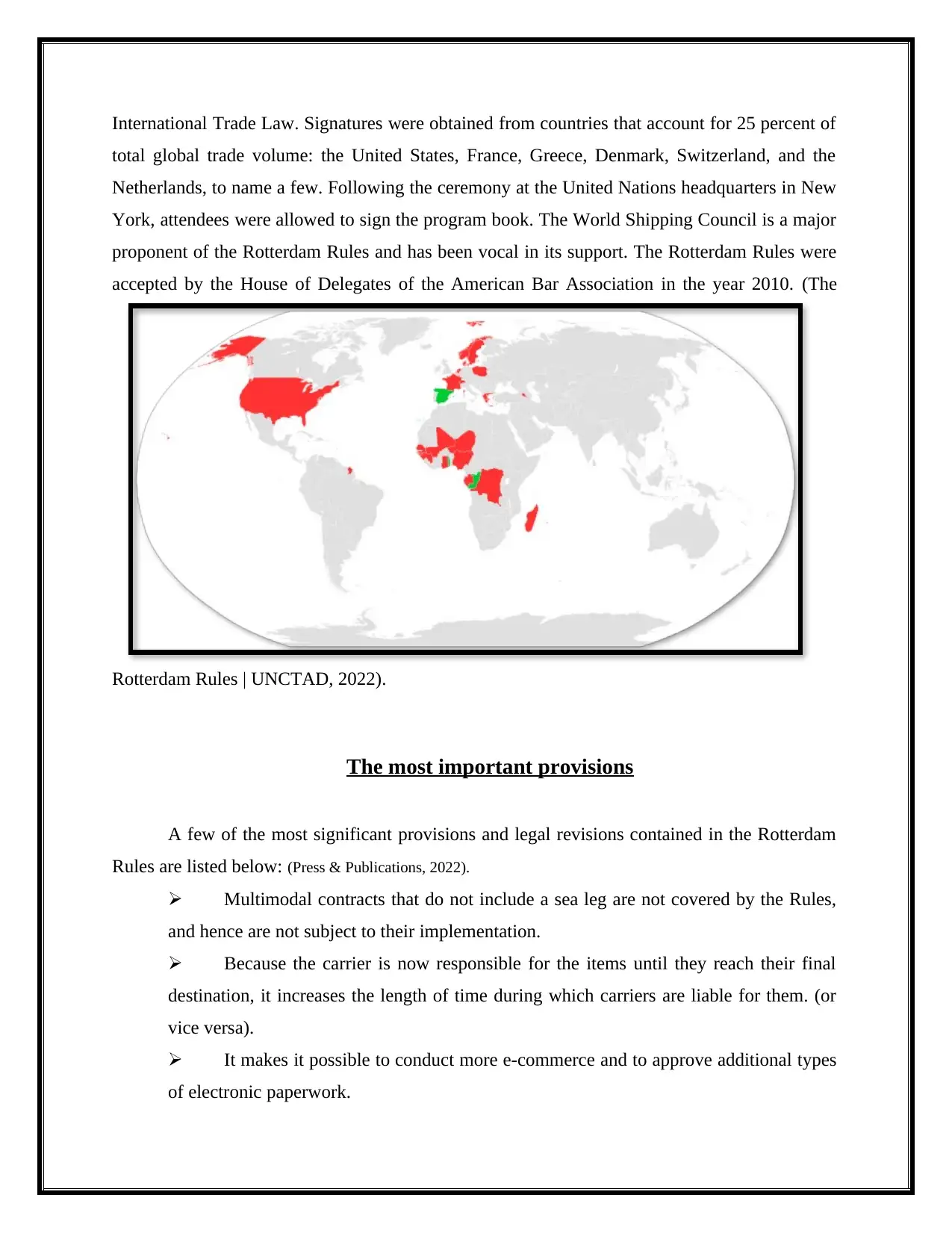
International Trade Law. Signatures were obtained from countries that account for 25 percent of
total global trade volume: the United States, France, Greece, Denmark, Switzerland, and the
Netherlands, to name a few. Following the ceremony at the United Nations headquarters in New
York, attendees were allowed to sign the program book. The World Shipping Council is a major
proponent of the Rotterdam Rules and has been vocal in its support. The Rotterdam Rules were
accepted by the House of Delegates of the American Bar Association in the year 2010. (The
Rotterdam Rules | UNCTAD, 2022).
The most important provisions
A few of the most significant provisions and legal revisions contained in the Rotterdam
Rules are listed below: (Press & Publications, 2022).
Multimodal contracts that do not include a sea leg are not covered by the Rules,
and hence are not subject to their implementation.
Because the carrier is now responsible for the items until they reach their final
destination, it increases the length of time during which carriers are liable for them. (or
vice versa).
It makes it possible to conduct more e-commerce and to approve additional types
of electronic paperwork.
total global trade volume: the United States, France, Greece, Denmark, Switzerland, and the
Netherlands, to name a few. Following the ceremony at the United Nations headquarters in New
York, attendees were allowed to sign the program book. The World Shipping Council is a major
proponent of the Rotterdam Rules and has been vocal in its support. The Rotterdam Rules were
accepted by the House of Delegates of the American Bar Association in the year 2010. (The
Rotterdam Rules | UNCTAD, 2022).
The most important provisions
A few of the most significant provisions and legal revisions contained in the Rotterdam
Rules are listed below: (Press & Publications, 2022).
Multimodal contracts that do not include a sea leg are not covered by the Rules,
and hence are not subject to their implementation.
Because the carrier is now responsible for the items until they reach their final
destination, it increases the length of time during which carriers are liable for them. (or
vice versa).
It makes it possible to conduct more e-commerce and to approve additional types
of electronic paperwork.
Secure Best Marks with AI Grader
Need help grading? Try our AI Grader for instant feedback on your assignments.
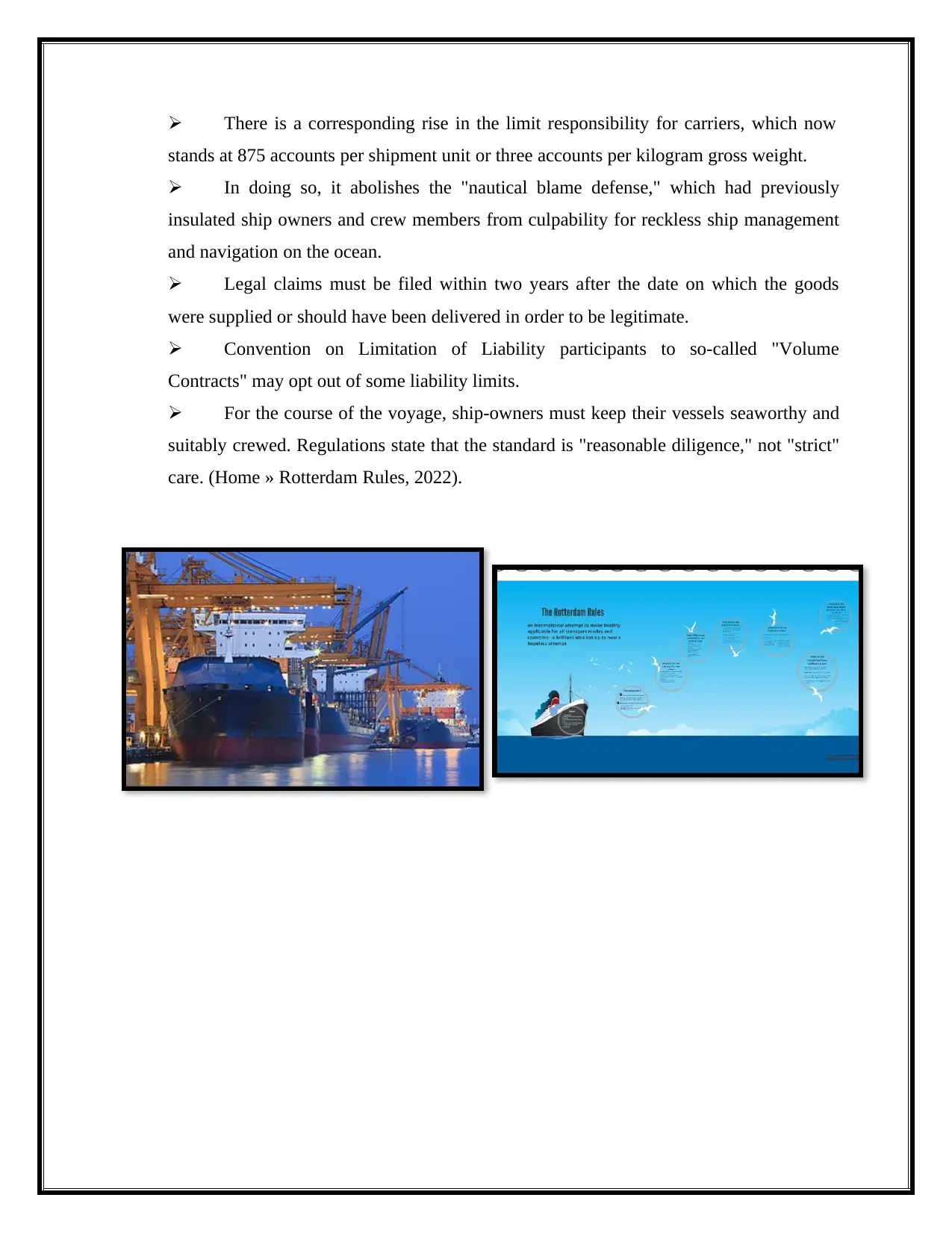
There is a corresponding rise in the limit responsibility for carriers, which now
stands at 875 accounts per shipment unit or three accounts per kilogram gross weight.
In doing so, it abolishes the "nautical blame defense," which had previously
insulated ship owners and crew members from culpability for reckless ship management
and navigation on the ocean.
Legal claims must be filed within two years after the date on which the goods
were supplied or should have been delivered in order to be legitimate.
Convention on Limitation of Liability participants to so-called "Volume
Contracts" may opt out of some liability limits.
For the course of the voyage, ship-owners must keep their vessels seaworthy and
suitably crewed. Regulations state that the standard is "reasonable diligence," not "strict"
care. (Home » Rotterdam Rules, 2022).
stands at 875 accounts per shipment unit or three accounts per kilogram gross weight.
In doing so, it abolishes the "nautical blame defense," which had previously
insulated ship owners and crew members from culpability for reckless ship management
and navigation on the ocean.
Legal claims must be filed within two years after the date on which the goods
were supplied or should have been delivered in order to be legitimate.
Convention on Limitation of Liability participants to so-called "Volume
Contracts" may opt out of some liability limits.
For the course of the voyage, ship-owners must keep their vessels seaworthy and
suitably crewed. Regulations state that the standard is "reasonable diligence," not "strict"
care. (Home » Rotterdam Rules, 2022).
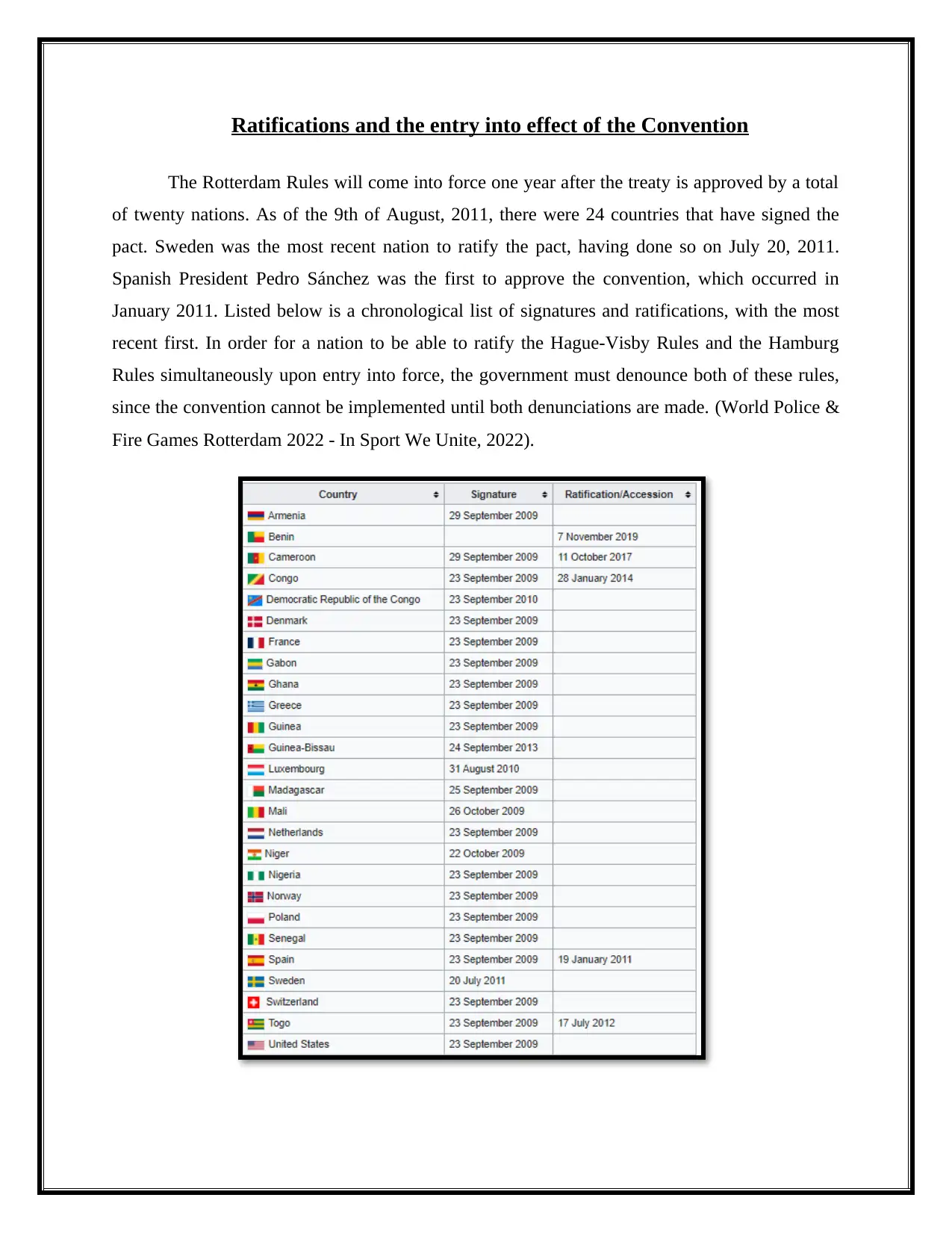
Ratifications and the entry into effect of the Convention
The Rotterdam Rules will come into force one year after the treaty is approved by a total
of twenty nations. As of the 9th of August, 2011, there were 24 countries that have signed the
pact. Sweden was the most recent nation to ratify the pact, having done so on July 20, 2011.
Spanish President Pedro Sánchez was the first to approve the convention, which occurred in
January 2011. Listed below is a chronological list of signatures and ratifications, with the most
recent first. In order for a nation to be able to ratify the Hague-Visby Rules and the Hamburg
Rules simultaneously upon entry into force, the government must denounce both of these rules,
since the convention cannot be implemented until both denunciations are made. (World Police &
Fire Games Rotterdam 2022 - In Sport We Unite, 2022).
The Rotterdam Rules will come into force one year after the treaty is approved by a total
of twenty nations. As of the 9th of August, 2011, there were 24 countries that have signed the
pact. Sweden was the most recent nation to ratify the pact, having done so on July 20, 2011.
Spanish President Pedro Sánchez was the first to approve the convention, which occurred in
January 2011. Listed below is a chronological list of signatures and ratifications, with the most
recent first. In order for a nation to be able to ratify the Hague-Visby Rules and the Hamburg
Rules simultaneously upon entry into force, the government must denounce both of these rules,
since the convention cannot be implemented until both denunciations are made. (World Police &
Fire Games Rotterdam 2022 - In Sport We Unite, 2022).
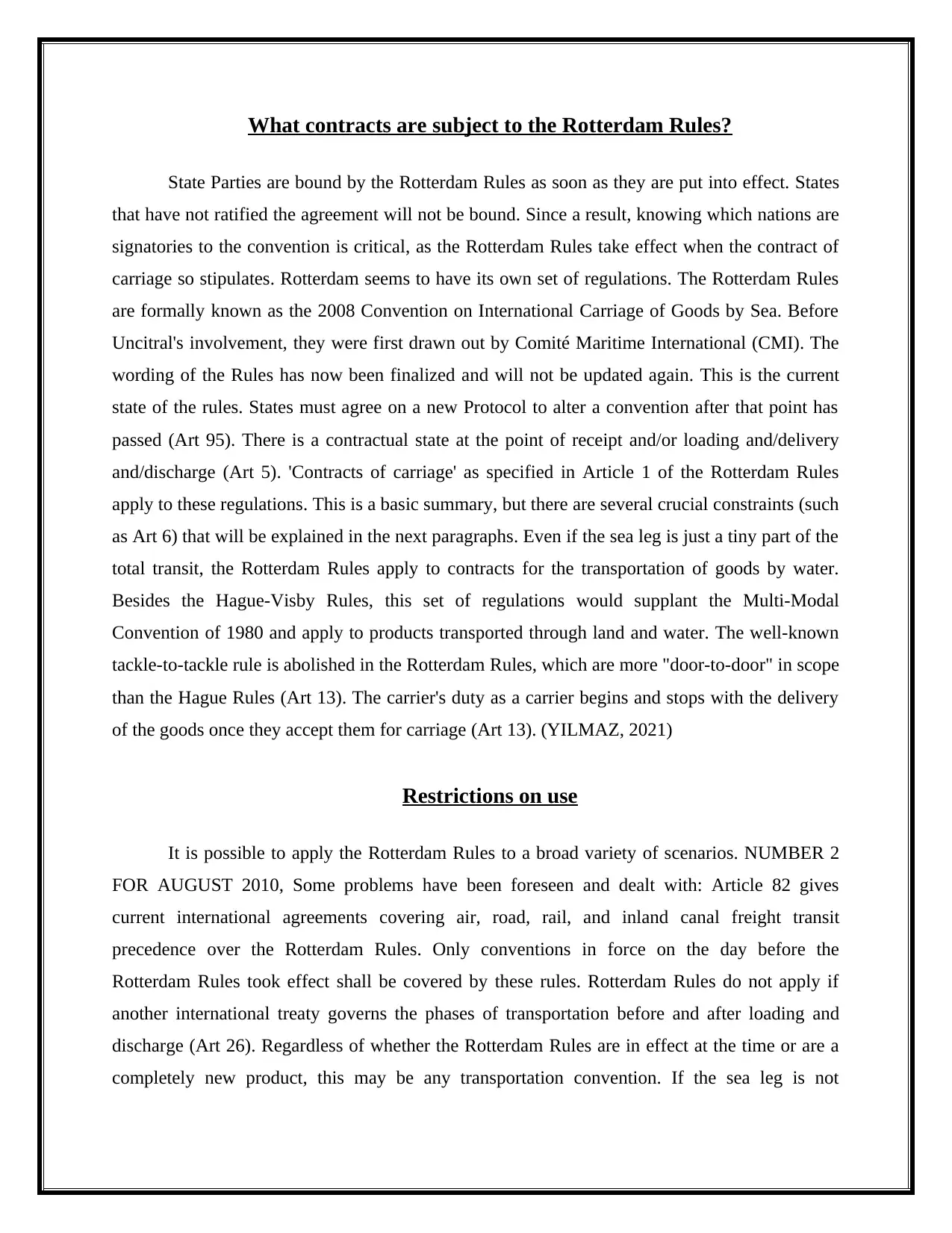
What contracts are subject to the Rotterdam Rules?
State Parties are bound by the Rotterdam Rules as soon as they are put into effect. States
that have not ratified the agreement will not be bound. Since a result, knowing which nations are
signatories to the convention is critical, as the Rotterdam Rules take effect when the contract of
carriage so stipulates. Rotterdam seems to have its own set of regulations. The Rotterdam Rules
are formally known as the 2008 Convention on International Carriage of Goods by Sea. Before
Uncitral's involvement, they were first drawn out by Comité Maritime International (CMI). The
wording of the Rules has now been finalized and will not be updated again. This is the current
state of the rules. States must agree on a new Protocol to alter a convention after that point has
passed (Art 95). There is a contractual state at the point of receipt and/or loading and/delivery
and/discharge (Art 5). 'Contracts of carriage' as specified in Article 1 of the Rotterdam Rules
apply to these regulations. This is a basic summary, but there are several crucial constraints (such
as Art 6) that will be explained in the next paragraphs. Even if the sea leg is just a tiny part of the
total transit, the Rotterdam Rules apply to contracts for the transportation of goods by water.
Besides the Hague-Visby Rules, this set of regulations would supplant the Multi-Modal
Convention of 1980 and apply to products transported through land and water. The well-known
tackle-to-tackle rule is abolished in the Rotterdam Rules, which are more "door-to-door" in scope
than the Hague Rules (Art 13). The carrier's duty as a carrier begins and stops with the delivery
of the goods once they accept them for carriage (Art 13). (YILMAZ, 2021)
Restrictions on use
It is possible to apply the Rotterdam Rules to a broad variety of scenarios. NUMBER 2
FOR AUGUST 2010, Some problems have been foreseen and dealt with: Article 82 gives
current international agreements covering air, road, rail, and inland canal freight transit
precedence over the Rotterdam Rules. Only conventions in force on the day before the
Rotterdam Rules took effect shall be covered by these rules. Rotterdam Rules do not apply if
another international treaty governs the phases of transportation before and after loading and
discharge (Art 26). Regardless of whether the Rotterdam Rules are in effect at the time or are a
completely new product, this may be any transportation convention. If the sea leg is not
State Parties are bound by the Rotterdam Rules as soon as they are put into effect. States
that have not ratified the agreement will not be bound. Since a result, knowing which nations are
signatories to the convention is critical, as the Rotterdam Rules take effect when the contract of
carriage so stipulates. Rotterdam seems to have its own set of regulations. The Rotterdam Rules
are formally known as the 2008 Convention on International Carriage of Goods by Sea. Before
Uncitral's involvement, they were first drawn out by Comité Maritime International (CMI). The
wording of the Rules has now been finalized and will not be updated again. This is the current
state of the rules. States must agree on a new Protocol to alter a convention after that point has
passed (Art 95). There is a contractual state at the point of receipt and/or loading and/delivery
and/discharge (Art 5). 'Contracts of carriage' as specified in Article 1 of the Rotterdam Rules
apply to these regulations. This is a basic summary, but there are several crucial constraints (such
as Art 6) that will be explained in the next paragraphs. Even if the sea leg is just a tiny part of the
total transit, the Rotterdam Rules apply to contracts for the transportation of goods by water.
Besides the Hague-Visby Rules, this set of regulations would supplant the Multi-Modal
Convention of 1980 and apply to products transported through land and water. The well-known
tackle-to-tackle rule is abolished in the Rotterdam Rules, which are more "door-to-door" in scope
than the Hague Rules (Art 13). The carrier's duty as a carrier begins and stops with the delivery
of the goods once they accept them for carriage (Art 13). (YILMAZ, 2021)
Restrictions on use
It is possible to apply the Rotterdam Rules to a broad variety of scenarios. NUMBER 2
FOR AUGUST 2010, Some problems have been foreseen and dealt with: Article 82 gives
current international agreements covering air, road, rail, and inland canal freight transit
precedence over the Rotterdam Rules. Only conventions in force on the day before the
Rotterdam Rules took effect shall be covered by these rules. Rotterdam Rules do not apply if
another international treaty governs the phases of transportation before and after loading and
discharge (Art 26). Regardless of whether the Rotterdam Rules are in effect at the time or are a
completely new product, this may be any transportation convention. If the sea leg is not
Paraphrase This Document
Need a fresh take? Get an instant paraphrase of this document with our AI Paraphraser
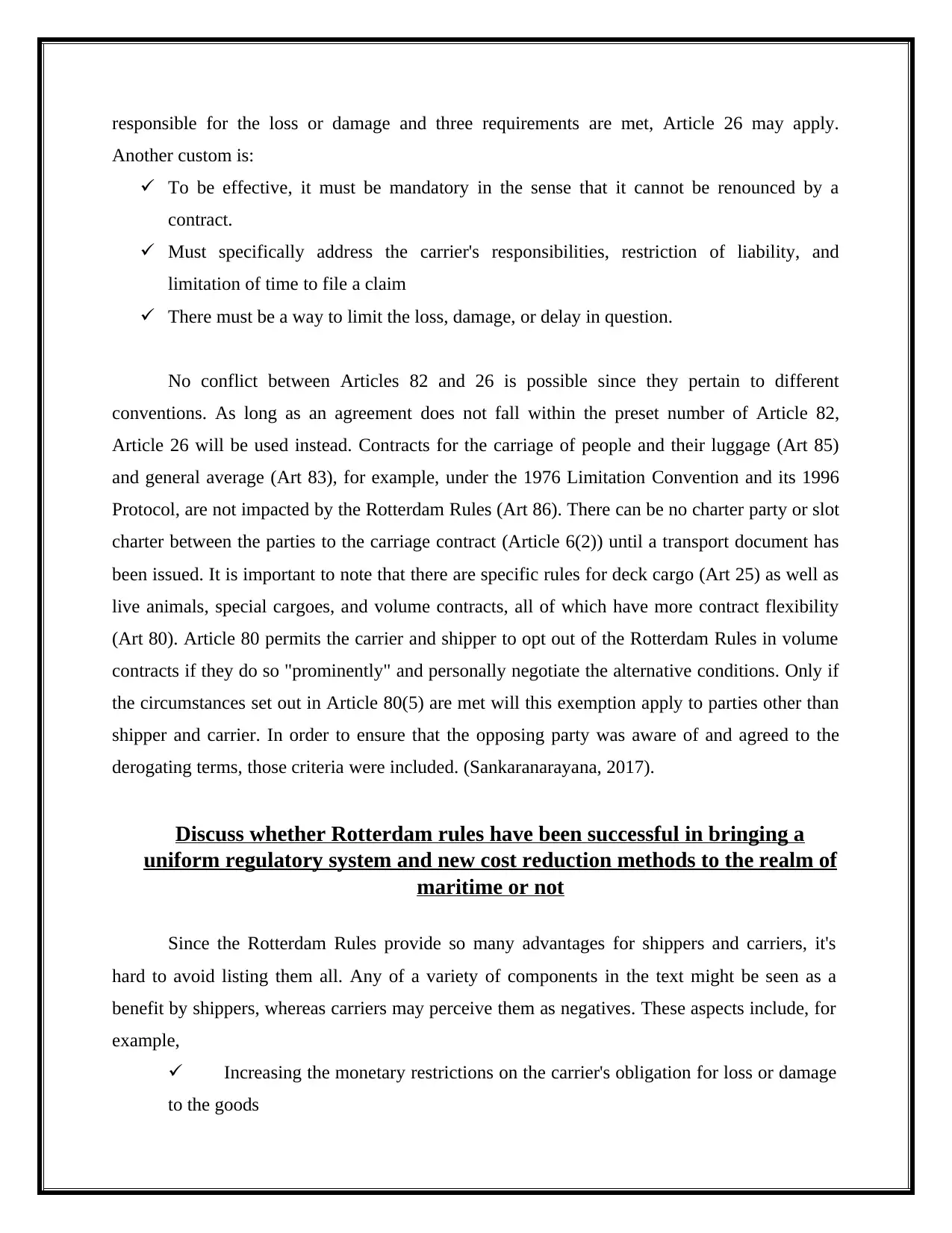
responsible for the loss or damage and three requirements are met, Article 26 may apply.
Another custom is:
To be effective, it must be mandatory in the sense that it cannot be renounced by a
contract.
Must specifically address the carrier's responsibilities, restriction of liability, and
limitation of time to file a claim
There must be a way to limit the loss, damage, or delay in question.
No conflict between Articles 82 and 26 is possible since they pertain to different
conventions. As long as an agreement does not fall within the preset number of Article 82,
Article 26 will be used instead. Contracts for the carriage of people and their luggage (Art 85)
and general average (Art 83), for example, under the 1976 Limitation Convention and its 1996
Protocol, are not impacted by the Rotterdam Rules (Art 86). There can be no charter party or slot
charter between the parties to the carriage contract (Article 6(2)) until a transport document has
been issued. It is important to note that there are specific rules for deck cargo (Art 25) as well as
live animals, special cargoes, and volume contracts, all of which have more contract flexibility
(Art 80). Article 80 permits the carrier and shipper to opt out of the Rotterdam Rules in volume
contracts if they do so "prominently" and personally negotiate the alternative conditions. Only if
the circumstances set out in Article 80(5) are met will this exemption apply to parties other than
shipper and carrier. In order to ensure that the opposing party was aware of and agreed to the
derogating terms, those criteria were included. (Sankaranarayana, 2017).
Discuss whether Rotterdam rules have been successful in bringing a
uniform regulatory system and new cost reduction methods to the realm of
maritime or not
Since the Rotterdam Rules provide so many advantages for shippers and carriers, it's
hard to avoid listing them all. Any of a variety of components in the text might be seen as a
benefit by shippers, whereas carriers may perceive them as negatives. These aspects include, for
example,
Increasing the monetary restrictions on the carrier's obligation for loss or damage
to the goods
Another custom is:
To be effective, it must be mandatory in the sense that it cannot be renounced by a
contract.
Must specifically address the carrier's responsibilities, restriction of liability, and
limitation of time to file a claim
There must be a way to limit the loss, damage, or delay in question.
No conflict between Articles 82 and 26 is possible since they pertain to different
conventions. As long as an agreement does not fall within the preset number of Article 82,
Article 26 will be used instead. Contracts for the carriage of people and their luggage (Art 85)
and general average (Art 83), for example, under the 1976 Limitation Convention and its 1996
Protocol, are not impacted by the Rotterdam Rules (Art 86). There can be no charter party or slot
charter between the parties to the carriage contract (Article 6(2)) until a transport document has
been issued. It is important to note that there are specific rules for deck cargo (Art 25) as well as
live animals, special cargoes, and volume contracts, all of which have more contract flexibility
(Art 80). Article 80 permits the carrier and shipper to opt out of the Rotterdam Rules in volume
contracts if they do so "prominently" and personally negotiate the alternative conditions. Only if
the circumstances set out in Article 80(5) are met will this exemption apply to parties other than
shipper and carrier. In order to ensure that the opposing party was aware of and agreed to the
derogating terms, those criteria were included. (Sankaranarayana, 2017).
Discuss whether Rotterdam rules have been successful in bringing a
uniform regulatory system and new cost reduction methods to the realm of
maritime or not
Since the Rotterdam Rules provide so many advantages for shippers and carriers, it's
hard to avoid listing them all. Any of a variety of components in the text might be seen as a
benefit by shippers, whereas carriers may perceive them as negatives. These aspects include, for
example,
Increasing the monetary restrictions on the carrier's obligation for loss or damage
to the goods
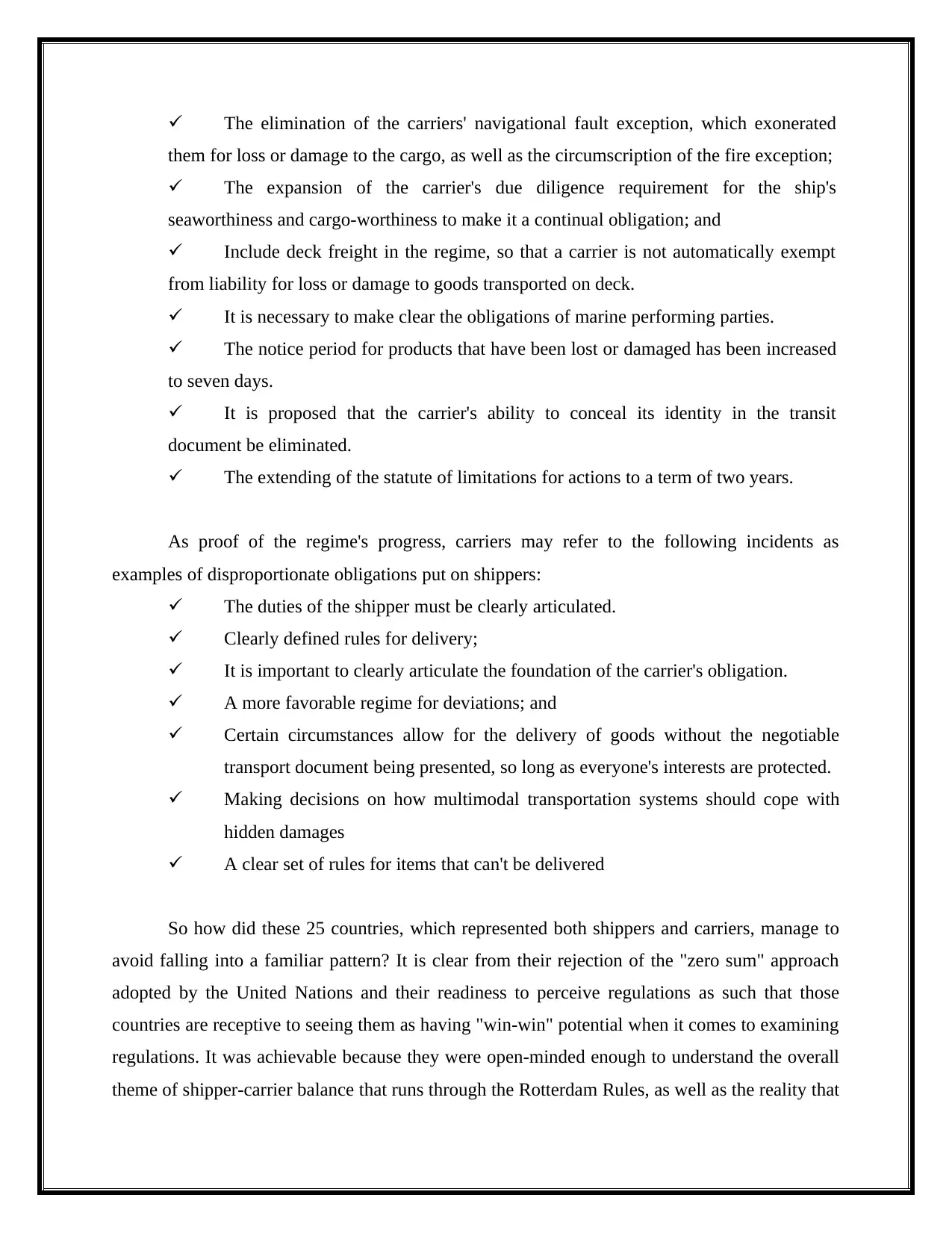
The elimination of the carriers' navigational fault exception, which exonerated
them for loss or damage to the cargo, as well as the circumscription of the fire exception;
The expansion of the carrier's due diligence requirement for the ship's
seaworthiness and cargo-worthiness to make it a continual obligation; and
Include deck freight in the regime, so that a carrier is not automatically exempt
from liability for loss or damage to goods transported on deck.
It is necessary to make clear the obligations of marine performing parties.
The notice period for products that have been lost or damaged has been increased
to seven days.
It is proposed that the carrier's ability to conceal its identity in the transit
document be eliminated.
The extending of the statute of limitations for actions to a term of two years.
As proof of the regime's progress, carriers may refer to the following incidents as
examples of disproportionate obligations put on shippers:
The duties of the shipper must be clearly articulated.
Clearly defined rules for delivery;
It is important to clearly articulate the foundation of the carrier's obligation.
A more favorable regime for deviations; and
Certain circumstances allow for the delivery of goods without the negotiable
transport document being presented, so long as everyone's interests are protected.
Making decisions on how multimodal transportation systems should cope with
hidden damages
A clear set of rules for items that can't be delivered
So how did these 25 countries, which represented both shippers and carriers, manage to
avoid falling into a familiar pattern? It is clear from their rejection of the "zero sum" approach
adopted by the United Nations and their readiness to perceive regulations as such that those
countries are receptive to seeing them as having "win-win" potential when it comes to examining
regulations. It was achievable because they were open-minded enough to understand the overall
theme of shipper-carrier balance that runs through the Rotterdam Rules, as well as the reality that
them for loss or damage to the cargo, as well as the circumscription of the fire exception;
The expansion of the carrier's due diligence requirement for the ship's
seaworthiness and cargo-worthiness to make it a continual obligation; and
Include deck freight in the regime, so that a carrier is not automatically exempt
from liability for loss or damage to goods transported on deck.
It is necessary to make clear the obligations of marine performing parties.
The notice period for products that have been lost or damaged has been increased
to seven days.
It is proposed that the carrier's ability to conceal its identity in the transit
document be eliminated.
The extending of the statute of limitations for actions to a term of two years.
As proof of the regime's progress, carriers may refer to the following incidents as
examples of disproportionate obligations put on shippers:
The duties of the shipper must be clearly articulated.
Clearly defined rules for delivery;
It is important to clearly articulate the foundation of the carrier's obligation.
A more favorable regime for deviations; and
Certain circumstances allow for the delivery of goods without the negotiable
transport document being presented, so long as everyone's interests are protected.
Making decisions on how multimodal transportation systems should cope with
hidden damages
A clear set of rules for items that can't be delivered
So how did these 25 countries, which represented both shippers and carriers, manage to
avoid falling into a familiar pattern? It is clear from their rejection of the "zero sum" approach
adopted by the United Nations and their readiness to perceive regulations as such that those
countries are receptive to seeing them as having "win-win" potential when it comes to examining
regulations. It was achievable because they were open-minded enough to understand the overall
theme of shipper-carrier balance that runs through the Rotterdam Rules, as well as the reality that
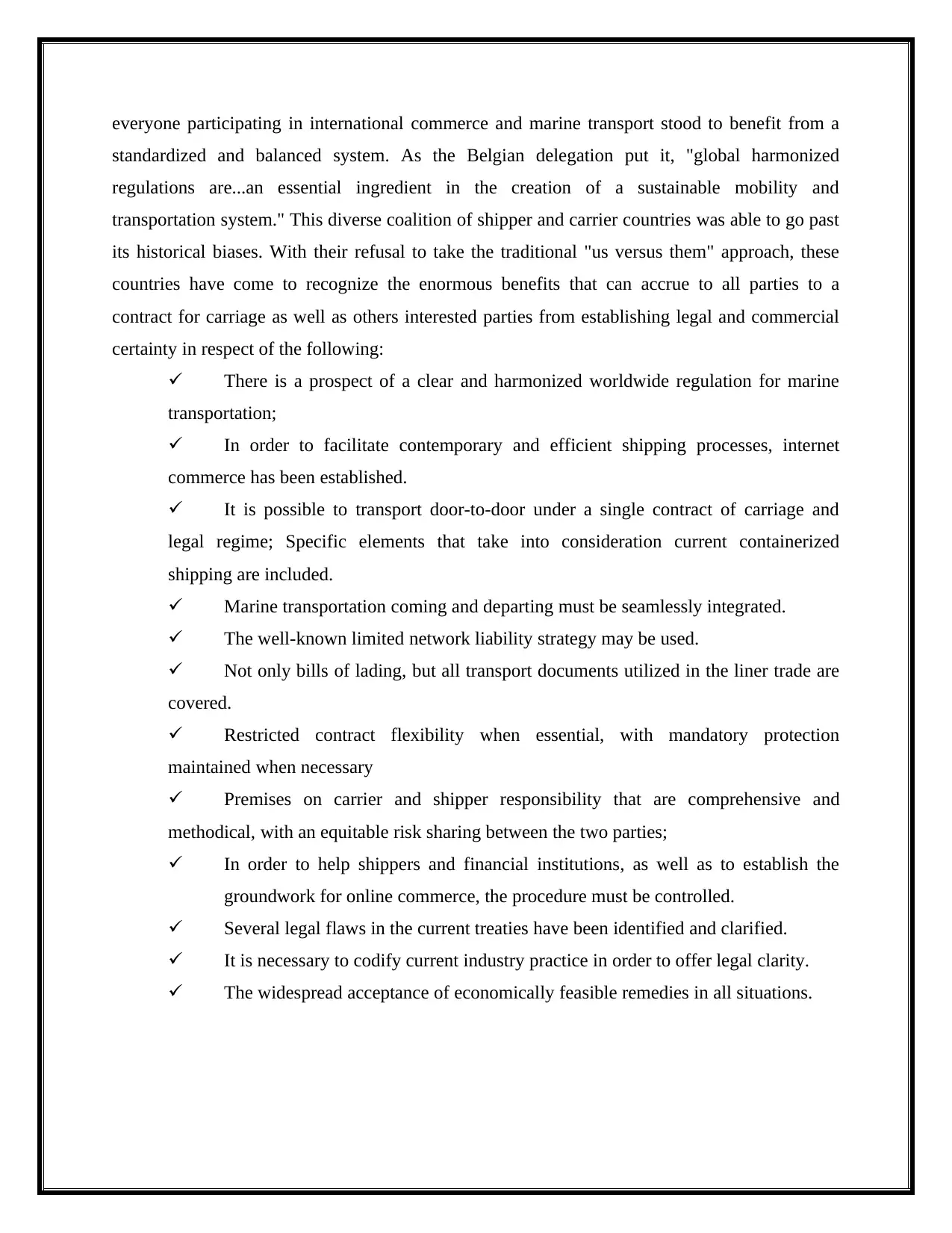
everyone participating in international commerce and marine transport stood to benefit from a
standardized and balanced system. As the Belgian delegation put it, "global harmonized
regulations are...an essential ingredient in the creation of a sustainable mobility and
transportation system." This diverse coalition of shipper and carrier countries was able to go past
its historical biases. With their refusal to take the traditional "us versus them" approach, these
countries have come to recognize the enormous benefits that can accrue to all parties to a
contract for carriage as well as others interested parties from establishing legal and commercial
certainty in respect of the following:
There is a prospect of a clear and harmonized worldwide regulation for marine
transportation;
In order to facilitate contemporary and efficient shipping processes, internet
commerce has been established.
It is possible to transport door-to-door under a single contract of carriage and
legal regime; Specific elements that take into consideration current containerized
shipping are included.
Marine transportation coming and departing must be seamlessly integrated.
The well-known limited network liability strategy may be used.
Not only bills of lading, but all transport documents utilized in the liner trade are
covered.
Restricted contract flexibility when essential, with mandatory protection
maintained when necessary
Premises on carrier and shipper responsibility that are comprehensive and
methodical, with an equitable risk sharing between the two parties;
In order to help shippers and financial institutions, as well as to establish the
groundwork for online commerce, the procedure must be controlled.
Several legal flaws in the current treaties have been identified and clarified.
It is necessary to codify current industry practice in order to offer legal clarity.
The widespread acceptance of economically feasible remedies in all situations.
standardized and balanced system. As the Belgian delegation put it, "global harmonized
regulations are...an essential ingredient in the creation of a sustainable mobility and
transportation system." This diverse coalition of shipper and carrier countries was able to go past
its historical biases. With their refusal to take the traditional "us versus them" approach, these
countries have come to recognize the enormous benefits that can accrue to all parties to a
contract for carriage as well as others interested parties from establishing legal and commercial
certainty in respect of the following:
There is a prospect of a clear and harmonized worldwide regulation for marine
transportation;
In order to facilitate contemporary and efficient shipping processes, internet
commerce has been established.
It is possible to transport door-to-door under a single contract of carriage and
legal regime; Specific elements that take into consideration current containerized
shipping are included.
Marine transportation coming and departing must be seamlessly integrated.
The well-known limited network liability strategy may be used.
Not only bills of lading, but all transport documents utilized in the liner trade are
covered.
Restricted contract flexibility when essential, with mandatory protection
maintained when necessary
Premises on carrier and shipper responsibility that are comprehensive and
methodical, with an equitable risk sharing between the two parties;
In order to help shippers and financial institutions, as well as to establish the
groundwork for online commerce, the procedure must be controlled.
Several legal flaws in the current treaties have been identified and clarified.
It is necessary to codify current industry practice in order to offer legal clarity.
The widespread acceptance of economically feasible remedies in all situations.
Secure Best Marks with AI Grader
Need help grading? Try our AI Grader for instant feedback on your assignments.
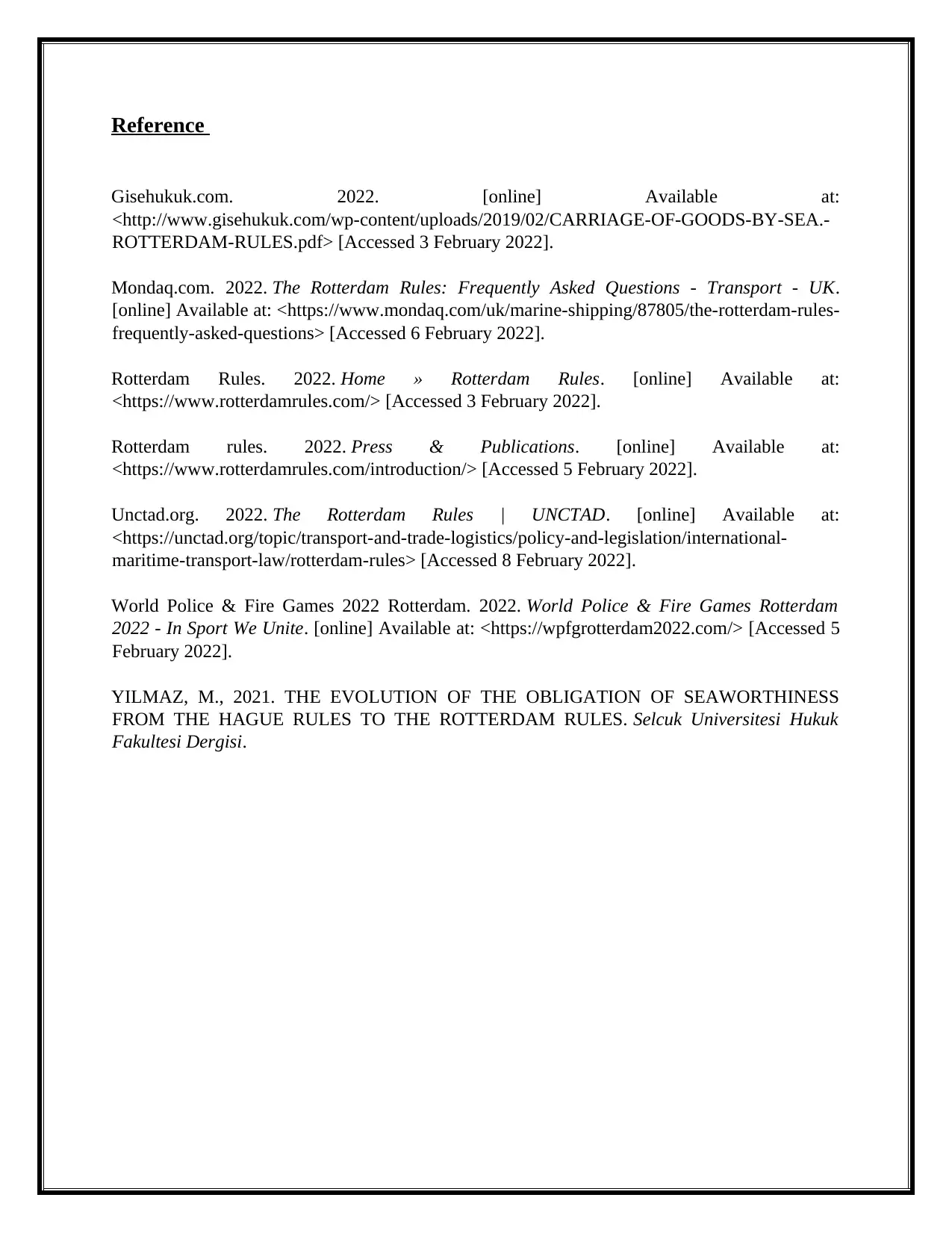
Reference
Gisehukuk.com. 2022. [online] Available at:
<http://www.gisehukuk.com/wp-content/uploads/2019/02/CARRIAGE-OF-GOODS-BY-SEA.-
ROTTERDAM-RULES.pdf> [Accessed 3 February 2022].
Mondaq.com. 2022. The Rotterdam Rules: Frequently Asked Questions - Transport - UK.
[online] Available at: <https://www.mondaq.com/uk/marine-shipping/87805/the-rotterdam-rules-
frequently-asked-questions> [Accessed 6 February 2022].
Rotterdam Rules. 2022. Home » Rotterdam Rules. [online] Available at:
<https://www.rotterdamrules.com/> [Accessed 3 February 2022].
Rotterdam rules. 2022. Press & Publications. [online] Available at:
<https://www.rotterdamrules.com/introduction/> [Accessed 5 February 2022].
Unctad.org. 2022. The Rotterdam Rules | UNCTAD. [online] Available at:
<https://unctad.org/topic/transport-and-trade-logistics/policy-and-legislation/international-
maritime-transport-law/rotterdam-rules> [Accessed 8 February 2022].
World Police & Fire Games 2022 Rotterdam. 2022. World Police & Fire Games Rotterdam
2022 - In Sport We Unite. [online] Available at: <https://wpfgrotterdam2022.com/> [Accessed 5
February 2022].
YILMAZ, M., 2021. THE EVOLUTION OF THE OBLIGATION OF SEAWORTHINESS
FROM THE HAGUE RULES TO THE ROTTERDAM RULES. Selcuk Universitesi Hukuk
Fakultesi Dergisi.
Gisehukuk.com. 2022. [online] Available at:
<http://www.gisehukuk.com/wp-content/uploads/2019/02/CARRIAGE-OF-GOODS-BY-SEA.-
ROTTERDAM-RULES.pdf> [Accessed 3 February 2022].
Mondaq.com. 2022. The Rotterdam Rules: Frequently Asked Questions - Transport - UK.
[online] Available at: <https://www.mondaq.com/uk/marine-shipping/87805/the-rotterdam-rules-
frequently-asked-questions> [Accessed 6 February 2022].
Rotterdam Rules. 2022. Home » Rotterdam Rules. [online] Available at:
<https://www.rotterdamrules.com/> [Accessed 3 February 2022].
Rotterdam rules. 2022. Press & Publications. [online] Available at:
<https://www.rotterdamrules.com/introduction/> [Accessed 5 February 2022].
Unctad.org. 2022. The Rotterdam Rules | UNCTAD. [online] Available at:
<https://unctad.org/topic/transport-and-trade-logistics/policy-and-legislation/international-
maritime-transport-law/rotterdam-rules> [Accessed 8 February 2022].
World Police & Fire Games 2022 Rotterdam. 2022. World Police & Fire Games Rotterdam
2022 - In Sport We Unite. [online] Available at: <https://wpfgrotterdam2022.com/> [Accessed 5
February 2022].
YILMAZ, M., 2021. THE EVOLUTION OF THE OBLIGATION OF SEAWORTHINESS
FROM THE HAGUE RULES TO THE ROTTERDAM RULES. Selcuk Universitesi Hukuk
Fakultesi Dergisi.
1 out of 11
Related Documents
Your All-in-One AI-Powered Toolkit for Academic Success.
+13062052269
info@desklib.com
Available 24*7 on WhatsApp / Email
![[object Object]](/_next/static/media/star-bottom.7253800d.svg)
Unlock your academic potential
© 2024 | Zucol Services PVT LTD | All rights reserved.





